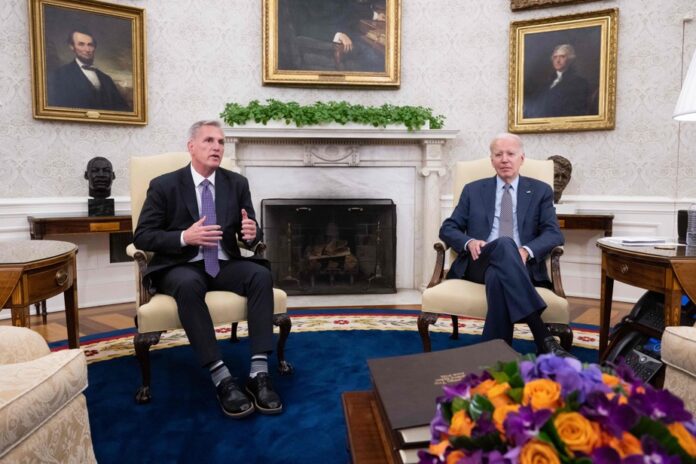(Washington) Joe Biden is ready to “compromise” with the Republican opposition on public spending, to end a political standoff that could send America into default, a source close to the government assured Wednesday. case.
The Democratic president made his Republican opponent Kevin McCarthy, boss of the House of Representatives, a proposal on certain expenses that would reduce the federal government bill by “more than 1000 billion dollars over ten years. »
This would come on top of the deficit reduction already promised by Joe Biden, which amounts to 3 trillion over ten years.
The White House would also, still according to this source, be ready to cap public spending for two years, where the Republicans are asking for a longer period.
The negotiating teams will have the opportunity to discuss these new proposals on Wednesday, with discussions between the two camps resuming at noon at the White House, we learned from a close source.
“I think we can make progress today,” assured Kevin McCarthy, while once again criticizing Joe Biden’s approach to this issue.
The 80-year-old Democrat initially simply ruled out negotiating under the threat of bankruptcy. He has now also offered to reallocate funds that were originally earmarked to respond to the COVID-19 pandemic.
Treasury Secretary Janet Yellen once again reiterated on Wednesday that it was urgent for Democrats and Republicans to find a budget compromise so that Congress could vote to raise the public debt ceiling.
The Conservatives condition their vote on an agreement on a cut in public spending.
If the Congress – divided between the Democratic Senate and the Republican House of Representatives – does not act, “it seems almost certain that we cannot go beyond the beginning of June,” recalled Janet Yellen.
In particular, said Ms. Yellen, the organization of “our payment system [which] was put in place to pay the bills” of the government, “not to decide which bills to pay or not”, thus leaving the Treasury no room to prioritize, for example, debt-related payments over other payments.
Without an agreement, “we will default on some of our obligations and that is not acceptable,” she insisted.
From June 1, the United States could therefore find itself in default of payment, that is to say unable to honor its financial commitments, whether it is salaries, pensions or reimbursements to their creditors.
The Secretary of the Treasury added that her services would provide Congress with additional details very soon regarding the date on which the country will actually be in default.
This unprecedented scenario would, according to economists, be synonymous with a massive recession and market rout in the United States, with possible contagion to the entire global economy.















